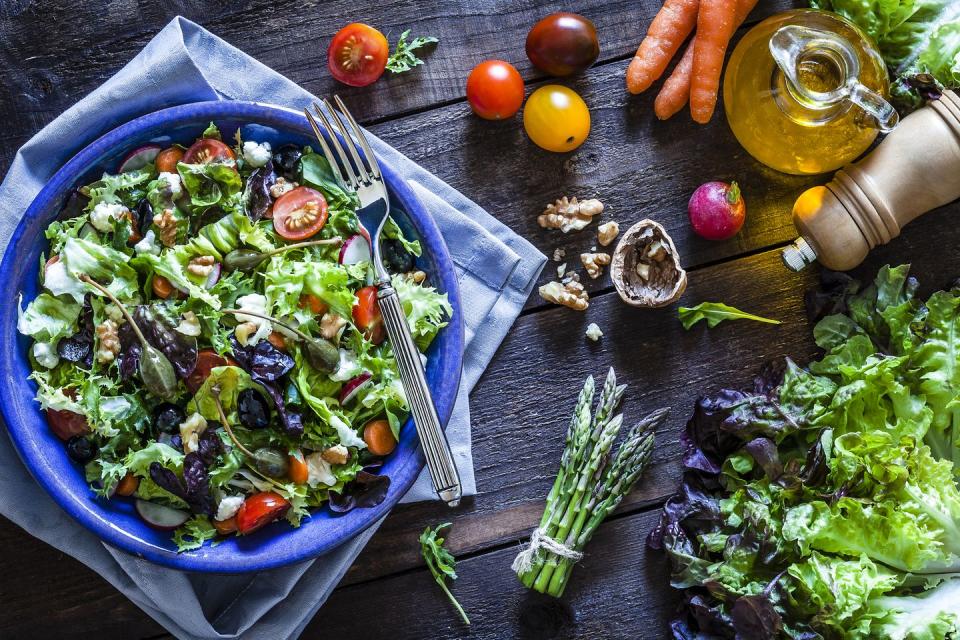Praise The Lord: Chris Pratt Reveals He's On A 'Bible-Inspired' Diet Where He Fasts For 21 Days

- Oops!Something went wrong.Please try again later.
There are diets, and then there are strict diets. And then, there's the Daniel Fast.
Technically, the Daniel Fast is not a diet, but rather a 21-day period of prayer and partial fasting practiced by some Christians. The fast has been around since 2007, when founder Susan Gregory first began blogging about it, but it's catching steam again thanks to actor Chris Pratt, who recently took to Instagram to let his 22.2 million followers know he is on day three of the Daniel Fast.
"It’s 21 days of prayer and fasting," he explained to followers in an Instagram story, according to the Huffington Post. "It’s going to coincide also, coincidentally, with the Lego Movie 2 junket. So, by the time you see me, I’ll probably be hallucinating. Stay tuned," he said.
So what is the Daniel Fast?
The Daniel Fast is based on the fasting experiences of Daniel, a prophet in the Old Testament of the Bible. On its website, the Daniel Fast is described as a "spiritual experience" that's like "pushing the 'pause button' on life so you can draw closer to God."
According to the website, hundreds of thousands of Christians start the Daniel Fast after the New Year, usually the first Sunday of the year. This year, the fast began at sunrise on Sunday, Jan. 6 for many churches, study groups, and individuals, and they'll continue fasting until sunset on Saturday, Jan. 26. While starting in early January has become a tradition, anyone can start their 21-day Daniel Fast at any point throughout the year, the website explains.
The Daniel Fast food list

Similar to a vegan diet (with added restrictions), Daniel Fast allows for only "foods grown from the seed," as taken from a translation of the King James Version of the Bible. That includes fruits, vegetables, and whole grains/unleavened bread. Healthy liquid oil and nuts and seeds are allowed as well.
Foods allowed during the Daniel Fast:
Here's exactly what you can eat during the 21-day Daniel Fast:
Fresh, frozen, dried, or canned vegetables such as broccoli, kale, mushrooms, tomatoes, and corn
Fresh, frozen, dried, or canned fruits such as apples, blueberries, dates, oranges, and raisins
Whole grains and legumes such as brown rice, buckwheat, oats, quinoa, popcorn, wild rice, black beans, chickpeas, and lentils
Healthy liquid oils such as canola, corn, olive, safflower, and soybean
Nuts and seeds such as almonds, cashews, sesame seeds, and nut butters including peanut butter
As far as beverages, you are limited to only water.
Foods you can't eat during the Daniel Fast
Here's everything you can't eat during the Daniel Fast:
Beverages other than water such as coffee, tea, soda, energy drinks, and alcohol
Meat and animal products including beef, lamp, pork, poultry, and fish
Dairy products including milk, cheese, cream, butter, and eggs
Sweeteners including sugar, honey syrups, stevia, and agave nectar
Leavening agents and leavened bread including baked goods and Ezekiel Bread
Refined and processed foods with artificial flavorings, additives, chemicals, white rice, white flour, and preservatives
Deep-fried foods including potato chips and French fries
Solid fats including shortening, margarine, and lard
How to prepare for the Daniel Fast
If you are planning to do the 21-day Daniel Fast, the website recommends slowly tapering off caffeine about a week beforehand so you don't experience withdrawals during the fast. The same is recommended for sugary foods, like candy, dessert, and soda, which can also cause unpleasant withdrawal symptoms.
Is the Daniel Fast healthy?
While the Daniel Fast involves restricting food for a spiritual purpose, the website acknowledges that some people do use the Daniel Fast eating plan purely as a way of improving their health and losing weight. In fact, it claims "thousands of people with health and weight issues experience success" with the fast. One nutritionist, however, sees this as highly unlikely.
"This diet is short-lived, and any benefit would likely not be seen in such a limited time frame," explains Alissa Rumsey, MS, RD, nutrition therapist and creator of the Ditch the Diet Challenge.
Instead, you'll likely experience side effects that are wholly unpleasant. "When the body is suddenly given less food than it’s used to, it goes into survival mode," Rumsey says. This can leave you with all kinds of unpleasant symptoms during and after the fast, like increased cravings (which can lead to overeating or binging), increased fat retention, lower metabolism, and higher levels of cortisol, a stress hormone.
And although the fast is temporary, it may even have detrimental long-term effects, like an increased risk for cardiovascular disease and a shorter life span, she says. "The body naturally wants to remain at a certain set point, and this is disrupted when someone suddenly deprives the body of nutrients," says Rumsey.
Keri Gans, MS, RDN, author of The Small Change Diet, doesn't recommend the Daniel Fast either, but says it may be safe for a healthy individual. "However, many individuals may experience negative side effects such as fatigue, headaches, and irritability due to the low calorie amount," says Gans. And if you're a caffeine addict, the symptoms are going to be a lot worse," she says.
So are there any health benefits? "If I had to look on the bright side, perhaps it would be that a person would be consuming lots of nutrient-rich fruits and veggies," says Gans.
Can you lose weight on the Daniel Fast?
Both nutritionists agree that the Daniel Fast simply isn't a sustainable method for someone seeking long-term weight loss. Any pounds you do lose during the process will likely pile back on.
"Weight loss at such a quick rate is typically a combination of water weight and muscle loss," Rumsey explains. "That water weight will go back on quickly once someone starts eating 'normally' again." This fluctuation in weight can even cause body image distortion after the 21 days are over, she says.
What does research say?
Unfortunately, research around the Daniel Fast is slim. A 2010 study in the journal Lipids in Health and Disease did investigate how the Daniel Fast affected the metabolic and cardiovascular health of 43 participants (30 women, 13 men). Researchers recorded lower blood pressure and LDL cholesterol levels among the participants post-fast and reported no negative effects on blood count or metabolism. Similar effects have been seen in research around other plant-based diets. However, due to the study's small sample size and the fact that all participants were relatively young and healthy, further research is definitely needed to fully understand the effects of the Daniel Fast.
So should you try the Daniel Fast?
If you're interested in the Daniel Fast, do it for your own spiritual reasons, as the founder intended. "Don’t do the fast with weight loss as a primary goal," says Rumsey. "If you insist on doing the fast, focus on the deeper meaning behind why you're doing it—and realize that the desired health effects from the fast will likely not be long-lived and may even be harmful in the long run."
Gans agrees. "People need to realize this is not a long-term solution to weight loss, but rather a quick fix," she says. "In order to lose weight for the long haul, they need to learn how to change their eating behaviors, not just eliminate foods, especially the foods they love."
And as with any extreme eating plan, be sure to talk to your doctor to make sure the 21-day fast is safe for you, especially if you're pregnant or have pre-existing medical conditions.
You Might Also Like

